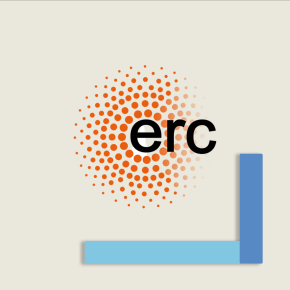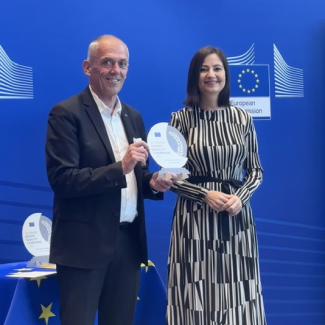
The winners of 2023 ERC Starting Grants from the CNRS
The European Research Council (ERC) has just announced the winners of its 'Starting' grants which provide significant funding for the projects of young researchers. The CNRS is the host institution for 20 grant winners.
These grants are intended to support exploratory research projects with a maximum duration of 5 years and a €1.5 million budget. They are for scientists who obtained their PhDs between 2 and 7 years ago. 'Starting' grants are the primary source of European funding for young researchers. 'Consolidator' grants provide funding of up to €2M for researchers who are 7-12 years after the PhD while and confirmed researchers can qualify for 'Advanced' grants of up to €2.5M.
This year female researchers were awarded 43% of these grants which is the highest proportion since the Starting Grants programme began. The President of the European Research Council Maria Leptin is delighted with this figure and "hopes this rate will continue to increase".
The grant winners are from 24 European countries including Germany (87 projects), France (50), the Netherlands (44) and the United Kingdom (32).
The CNRS has confirmed its strengths in responding to ERC calls for proposals with a success rate of 19.6% for its researchers' applications. The organisation remains the leading beneficiary of these grants in France with 20 winning scientists which amounts to 40% of French prize-winners.
Update (10/26/23): a researcher on the waiting list has been confirmed, making the CNRS the host institution for 21 ERC Starting 2023 grants.
The list of 21 scientists awarded Starting Grants who belong to the CNRS:
- Prince AMANIAMPONG – ConCASM – Institut de Chimie des Milieux et Matériaux de Poitiers (CNRS/University of Poitiers, Poitiers Institute of Environmental and Materials Chemistry) ( IC2MP) for 'Controlling Cavitation for the Activation of Small Molecules'.
- James BRADLEY – SIESTA – Mediterranean Institute of Oceanography (CNRS/Aix-Marseille University/Research Institute for Development (IRD)/University of Toulon) (INSU) for 'The Role of Microbial Dormancy as an Ecological and Biogeochemical Regulator on Earth'.
- Martin BRANDENBOURGER – Self-Flow – Institut de recherche sur les phénomènes hors équilibre (CNRS/Aix-Marseille University/Centrale Méditerranée, Institute for Research into Non-Equilibrium Phenomena) (INSIS) for 'Self-contracting vascular networks: From fluid transport to autonomous locomotion of soft materials'.
- Luca CALATRONI – MALIN – Sophia Antipolis Laboratory for Computer Science, Signals and Systems (CNRS/Université Côte d’Azur) (INS2I) for 'Model-aware learning for imaging inverse problems in fluorescence microscopy'.
- Laura CANTINI – MULTIview-CELL – Developmental and Stem Cell Biology Department (CNRS/Institut Pasteur) (INSB) for 'Integration of single-cell multi-omics data across space and time to unlock cellular trajectories'.
- Mathieu CASADO – AVAR – Laboratory for Sciences of Climate and Environment (CNRS/CEA/University of Versailles Saint-Quentin-en-Yvelines) (INSU) for 'Antarctic'.
- Geoffroy COUTEAU – OBELiSC – Institut de Recherche en Informatique Fondamentale (CNRS/Université Paris Cité, Fundamental Computer Science Research Institute) (INS2I) for 'Overcoming Barriers and Efficiency Limitations in Secure Computation'.
- Céline DELLOYE-BOURGEOIS – CANEUTREAT – Cancer Research Center of Lyon (CNRS/ Léon Bérard Comprehensive Cancer Centre/Inserm/ Claude Bernard University) (INSB) for 'Decrypting neuro-cancer crosstalk in pediatric cancers of the peripheral nervous system'.
- Olesia DMYTRUK – Q-Light-Topo – Center for Theoretical Physics (CNRS/École Polytechnique) (INP) for 'Quantum light-controlled topological phases of matter'.
- Chloe GIRARD – DYNACO – Institute of Integrative Cell Biology (CNRS/CEA/ Paris-Saclay University) (INSB) for 'DYNAmics of CrossOver designation'.
- Ana GOMES – Janus – Laboratory of Pathogens and Host Immunity (CNRS/University of Montpellier) for 'Cell cycle progression in malaria parasites'.
- David GUEORGUIEV – TANGO – Institute of Intelligent Systems and Robotics (CNRS/Sorbonne University) (INS2I) for 'Computational Modelling of Tangible Objects on Multisensory Interfaces'.
- Jacek JENDREJ – INSOLIT – Laboratoire Analyse, Géométrie et Applications (CNRS/ Sorbonne Paris Nord University, Analysis, Geometry and Applications Laboratory) (INSMI) for 'Interacting Solitary Waves in Nonlinear Wave Equations'.
- Arthur LEFÈVRE – MarmOTChat – Institut des Sciences Cognitives Marc Jeannerod (CNRS/Claude Bernard University, M. Jeannerod Cognitive Sciences Institute) (INSB) for 'Oxytocin regulates marmosets’ affiliation and vocal communication'.
- Anaïs MENNY – SignalHet – Institut de génomique fonctionnelle (CNRS/Inserm/Université de Montpellier) (INSB)
- Claire MÉROT – EVOL-SV – Ecobio: Ecosystems, biodiversity, evolution (CNRS/University of Rennes) (INEE) for 'The role of structural genomic variants in eco-evolutionary processes'.
- Nancy PAUL – PAX – Kastler Brossel Laboratory (CNRS/Collège de France/ENS – PSL/Sorbonne University) (INP) for 'antiProtonic Atom X-ray spectroscopy'.
- Pierre RONCERAY – SuperStoc – Center of Nanoscience of Marseille (CNRS/Aix-Marseille University) (INP) for 'Super-resolved stochastic inference: learning the dynamics of soft biological matter'.
- Clémence ROSE – HAVEN – Laboratoire de météorologie physique (CNRS/Université Clermont Auvergne, Laboratory of Physical Meteorology) (INSU) for 'High above the ocean: unexplored molecular processes'.
- Heidi SERRA – MeioPoly – Institute of Genetics, Reproduction & Development (CNRS/Inserm/University of Clermont Auvergne) (INSB) for 'Meiotic adaptation to allopolyploidy'.
- Benjamin WESOLOWSKI – AGATHA CRYPTY – Unit of Pure and Applied Mathematics (CNRS/ENS Lyon) (INSMI) for 'Algebraic groups at the heart of post-quantum cryptography'.


